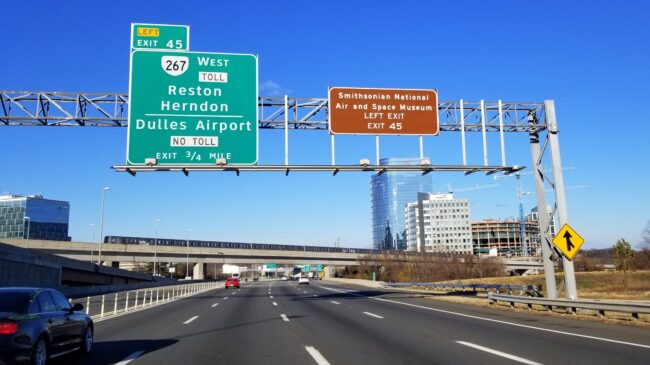Anti-toll-road populism has been spreading across many parts of the country. In Northern Virginia, long an anti-populist sanctuary, the combination of a Dulles Greenway proposal that would increase toll rates and elected officials dreaming of higher office has proven to be a combustible combination.
The Dulles Greenway is a privately owned highway in Loudoun County, Virginia. The 13-mile road is owned by Trip II, whose largest partner is Atlas Arteria. The Greenway has a peak toll rate of $5.80 and an off-peak rate of $5.25. The consortium proposes increasing the toll by 40% during peak travel hours to $8.10 and by 22% during off-peak hours to $6.40.
It is worth noting that it was not the Greenway’s original intent to increase tolls by this magnitude. Earlier this year, Virginia House of Delegates members Michael Webert and David Reid introduced legislation backed by the Greenway and the governor to move the Greenway from operating under the Virginia Highway Corporation Act of 1988 to operating under the Public Private Transportation Act of 1995. The proposal included ideas to reduce costs and implement distance-based tolling.
Unfortunately, the plan was opposed by the Loudoun County Board of Supervisors, who disliked adopting (at the time) distance-based pricing, and by legislators concerned that it did not give them control over the Greenway.
Therefore, the Dulles Greenway moved on to Plan B to increase the toll rate to $0.62 per mile, one of the higher rates in the U.S. for fixed-rate toll facilities. As the only highway operating under the Virginia Highway Corporation Act, any toll increase must be approved by the State Corporation Commission.
This approval process gives Virginia’s politicians a chance to grandstand. The Loudoun County Board of Supervisors, which is controlled by Democrats and opposed the earlier state proposal, also opposes the latest toll increase, stating, “Loudoun County has opposed toll rate increases requested by the operators of the Dulles Greenway.” Loudoun County officials plan to testify against the increase.
Republican Attorney General Jason Miyares also opposes the toll rate increase and has issued a notice formally objecting to it, noting, “It’s getting harder and harder for everyday Virginians to earn a living. It concerns me greatly (replying to the Greenway toll increases).” While a formal objection is not a legal objection, it does set a precedent.
The Dulles Greenway has higher tolls, but its operations are limited by factors outside its control. First, as already noted, the State Corporation Commission must approve toll increases because the Greenway, by law, is an investor-owned utility. Therefore, the Greenway is limited in what toll rate it can charge and when that rate can be increased.
Second, the Metropolitan Washington Airports Authority (MWAA) owns some of the land under the Greenway, so the toll road has to pay land rental fees to the airport.
Third, the Greenway has to pay property taxes to Loudoun County. No other highway operator in the Commonwealth, publicly owned or privately owned, is subject to property taxes. The Greenway’s property taxes recently increased by 20%, primarily to pay Loudoun County’s tab for the construction of the underused Washington Metropolitan Area Transportation Authority’s (WMATA) Silver Line to Dulles Airport.
For context, let’s compare the Greenway to the nearby Dulles Toll Road. The Dulles Toll Road does not need to pay land rental fees (since the airport owns it) nor property taxes to neighboring Fairfax County. It does have to pay a chunk of change to construct the Silver Line. But its lanes are narrower than the lanes on the Greenway, and its speed limit is 10 miles per hour lower. It does not offer as premium a product. Yet its $6.00 toll rate equals $0.50 per mile, not much lower than the Greenway’s proposed rate.
Yet, when the Dulles Toll Road hiked its tolls earlier this year from $4.75 to $6.00, no county officials were testifying against the increase, nor were state officials threatening inquiries. WMAA did not have to get governmental approval to increase tolls. Why the disparate treatment?
The answer is that the Dulles Greenway is a private road, and private entities make convenient political foils. Elected officials can publicly bully private companies in hopes of generating attention. They can complain about the high costs to drivers, even if public policies and other elected officials are the reason for those costs.
What are some real solutions?
First, policymakers should allow the Greenway to operate under the Public-Private Transportation Act instead of the Virginia Highway Corporation Act. This would place the Greenway on par with other toll roads in Virginia, including those that are privately owned, such as the South Jordan Bridge or any of the managed lane facilities, that are exempt from property taxes. It would also free the Greenway from regulation by the State Corporation Commission, which focuses on insurance and financial institutions.
Second, Virginia should not force toll roads, public and private, or drivers paying the tolls to subsidize a heavy rail transit line. If the government builds a heavy rail line, it should aim to recoup the costs from riders and the businesses that benefit from the line. Businesses that directly benefit from the Silver Line should pay more of the costs. Infrastructure should be paid for by its users.

